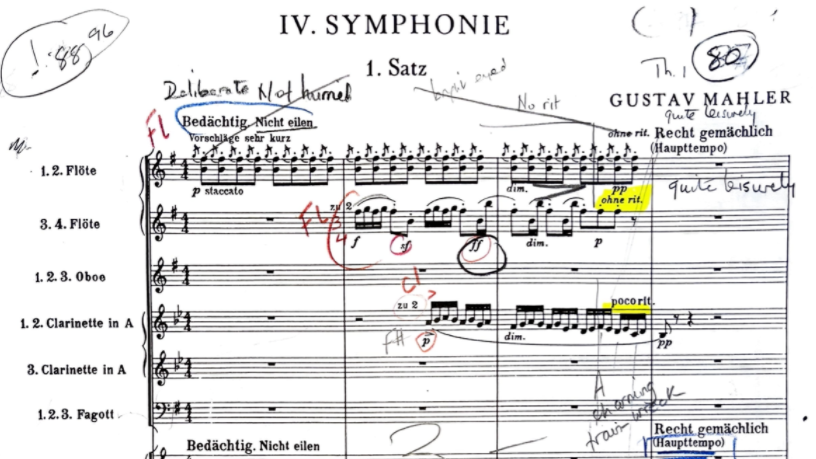Shiri Meerson: Charades and Conducting

Following a conducting masterclass on Zoom during the Covid-19 pandemic, conductor Shiri Meerson reached out to Ben to share her thoughts:
I would like to share with you two separate thoughts I had regarding our Zoom masterclass.
The first one is about the concept of conducting without having musicians responding to your movements.
Watching the different conductors in the class conveying their interpretation with no immediate musical feedback was very eye-opening for me. It made me realize how much one can learn and judge about a conductor just by watching him on mute. As a cellist I could instantly relate to your story about the “Charades” game you played with your first wife and I could easily see in my mind the exact pose any cellist would assume before the Schumann concerto or the Haydn. It also reminded me of a game I once played with my cello professor Micha Haran, where he asked me to conduct something without telling him what it was and without singing and to my amazement he very quickly recognized both Beethoven’s Pastoral Symphony and Brahms’ violin concerto. This concept brought me to wonder whether we could consider adding this platform as an alternative pre-screening video audition to allow talented aspiring conductors, who are not fortunate enough to have easy access to an orchestra, the opportunity to compete against those who are. If conducting is first and foremost about knowing the score to its core and knowing exactly what you want and how to convey it, wouldn’t it be interesting to test the ability of an aspiring conductor to convey under the extreme terms of having only his imagination and internal hearing to rely on? Furthermore, wouldn’t it level the playing field between countries and populations that have more limited resources?
BZ: This is brilliant. It should be instituted immediately. The first time I met Gustav Meier, in the waiting room at the Chicago airport, he said he was happy to meet me but instead of shaking my hand, he asked me to conduct something. Just like that. Sitting in a chair, I conducted some Beethoven, a phrase or two of Brahms – small gestures, like a conversation. That was enough. He wanted to get to know me. What better way? There was a similar exchange when I arrived at the age of 15 at the Pensione in Florence, when I started my studies with Gaspar Cassadó. Before I was shown my room, I was asked to take out my cello to play to the staff. In reply, the head waiter sang a Donizetti aria and his wife, the chamber maid, sang, I seem to remember, something from the Barber of Seville. Perhaps, in this Covid age, as hand-shaking disappears it will be replaced with conducting! I was delighted when you told the story of Micha Haran, since he was the cellist in the Israel Philharmonic who I had mentioned in the class as having written 5 pages of white sheets! What a Mensch! Incidentally it is a tribute to both of you that he was able to recognize the Brahms violin concerto and not be confused with the first movement of the Second Symphony, since they are virtually identical, (tempo, character and key), except that the symphony begins with an up-beat and the concerto with a down beat. That might have been the giveaway.
Second thought I had was regarding your mention of optimism and leadership in harsh times and the conductor’s role as the orchestra’s spiritual leader. For that I have a very heart-warming story that happened to me last November and that has changed the very essence of how I look at the meaning of being a conductor and what sort of leader I aspire to become.
A year ago, I decided to organize a tribute concert to my parents who were both at a very advanced stage of Parkinson’s disease. A concert seemed to me the best way to express my appreciation and admiration for them, to display my father’s amazing work as a comedian and filmmaker and to show to my mother how much impact she has had on her colleagues in the Israel Philharmonic Orchestra by inviting them to participate. The concert was mostly chamber music but there was one piece that combined all the players – the Mahler 4th Finale.
Throughout the planning I was all the time concerned with not imposing too much on the already extremely busy musicians. To me it seemed as though everyone was working only for my parents’ sake, and didn’t realize the incredible affect the concert would eventually have on them as well.
A day after the concert one of the violinists called to thank me, saying that she had never in her life experienced such a concert in which every note was played out of pure love. That the atmosphere in the hall was so moving and inspiring. The pianist wrote to me quoting the clarinetist “thank you Shiri for a lesson about love”. Their reaction was extremely inspiring and I started to wonder- Could all concerts be filled with such love? and how can I as a conductor lead towards such an important goal? A month and a half after the concert my mother passed away and I suddenly realized the amazing gift I had given to her friends. I had given them a chance to reconnect with her after so many years of separation and to say goodbye. This Idea gave me a lot of comfort.
Thank you for listening to my thoughts now and also 18 years ago when my dear Mother Ruthy the double-bassist introduced me as her young daughter aspiring to become a conductor. I vividly remember your enthusiasm and encouragement. Thank you.
All the best,
Shiri (Amir) Meerson
BZ: Shiri, I find this story very moving. What makes it so compelling is that you are not at all absorbed with yourself in the actions you describe. YOUR STORY IS AN EXAMPLE OF SOMEONE ACTING PURELY AS A CONTRIBUTION. We musicians are fortunate in that we dwell in an environment that supports us to become contributors, just as water gives life to fish and air supports flight for birds.
 Benjamin Zander Center
Benjamin Zander Center